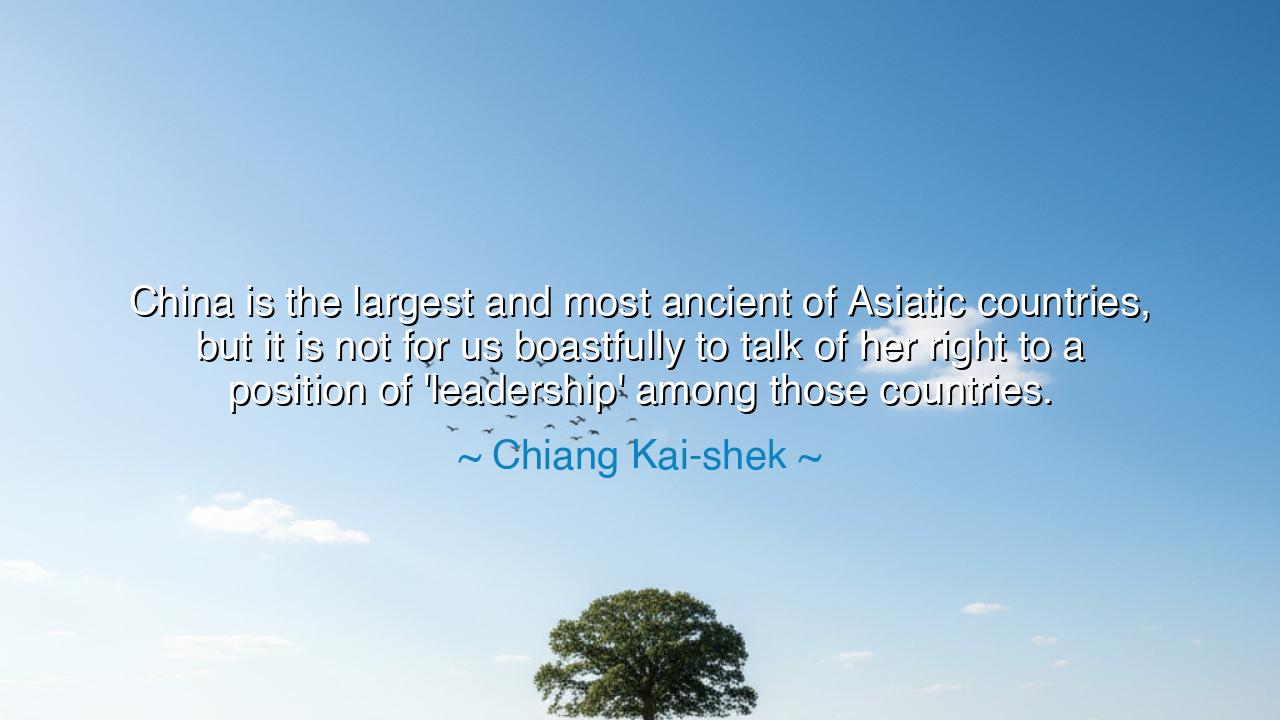
China is the largest and most ancient of Asiatic countries, but
China is the largest and most ancient of Asiatic countries, but it is not for us boastfully to talk of her right to a position of 'leadership' among those countries.






When Chiang Kai-shek, the leader who bore the weight of a civilization’s survival upon his shoulders, said, “China is the largest and most ancient of Asiatic countries, but it is not for us boastfully to talk of her right to a position of ‘leadership’ among those countries,” he spoke with the humility of a statesman and the wisdom of a sage. His words rise from the deep river of Chinese history, flowing through dynasties and revolutions alike, carrying both the glory and the burden of greatness. In them lies a profound teaching: true leadership is never claimed through pride, but earned through service, integrity, and sacrifice.
The origin of this quote comes from Chiang’s vision for China during one of its most turbulent eras — the early twentieth century, when the nation stood between ruin and renewal. As the world shifted from the ashes of empire to the rise of new powers, China, though vast and ancient, was weakened by civil war, foreign aggression, and internal division. Chiang understood that the world did not need another empire boasting of its destiny, but a moral power, a nation that led not by domination but by example. His words, therefore, were both a caution and a compass — reminding his people that greatness without humility becomes decay, and that pride, untempered by wisdom, destroys the very foundation of leadership.
By saying it is “not for us boastfully to talk of leadership,” Chiang was teaching a principle as old as the Analects of Confucius: that the virtuous ruler does not proclaim his authority, but lives it quietly, so that others follow him willingly. Boastfulness, in his eyes, was the language of insecurity — a symptom of nations that seek validation rather than harmony. True strength, he believed, lies in restraint, in the quiet confidence of purpose. Just as the bamboo bends in the storm but never breaks, so too must a nation of depth and wisdom act with grace, not arrogance.
Chiang’s humility carried echoes of the ancient dynasties that once shaped Asia. For centuries, China had stood as the “Middle Kingdom,” a cultural and moral beacon for neighboring lands. Yet he knew that the modern world no longer revolved around kingdoms or hierarchy — it demanded cooperation, understanding, and mutual respect. He sought not to restore China as a ruler over others, but as a partner in civilization, guiding through peace rather than conquest. His restraint was not weakness; it was a strategic and spiritual strength — a recognition that the most enduring power is moral power, and that the flame of influence burns brightest when it is not forced to burn at all.
Consider the wisdom of history itself. When Emperor Ashoka of India renounced war after the bloodshed of Kalinga, his kingdom did not shrink — it grew in reverence. His influence spread not through armies, but through compassion, tolerance, and justice. Similarly, Chiang Kai-shek sought a vision of leadership that would elevate China not through pride, but through unity and contribution. He believed that China’s destiny was not to rule Asia by command, but to uplift Asia by example — to be a civilization of dignity, discipline, and moral clarity amid chaos.
In this light, Chiang’s statement is both a political philosophy and a moral mirror. It warns against the intoxication of power — that disease of nations which turns heritage into hubris. For when a people become too proud of their past, they forget their duty to the present. When they cling to the memory of greatness, they lose the humility required to rebuild it. Chiang was reminding his people that leadership is not a crown to be worn, but a burden to be carried, not an inheritance to boast of, but a responsibility to fulfill anew in every generation.
The lesson of his words reaches beyond the borders of China. It speaks to every nation, every leader, and every individual who would seek to guide others. Do not proclaim your greatness — prove it through action. Do not demand respect — earn it through service. Do not chase leadership — embody it so naturally that others will recognize it without your saying a word. True leadership is like light: it does not announce itself, yet it reveals everything it touches.
So let Chiang Kai-shek’s wisdom stand as a pillar for the ages: humility is the soul of greatness. Let the proud remember that arrogance is a fragile throne, and let the wise remember that patience builds empires of the spirit. Whether in nations or in hearts, the path to true leadership begins not in boasting of destiny, but in fulfilling one’s duty with quiet honor. For it is not the loudest that lead the world forward — it is those who, in silence and humility, bear the torch of truth and light the way for all.






AAdministratorAdministrator
Welcome, honored guests. Please leave a comment, we will respond soon